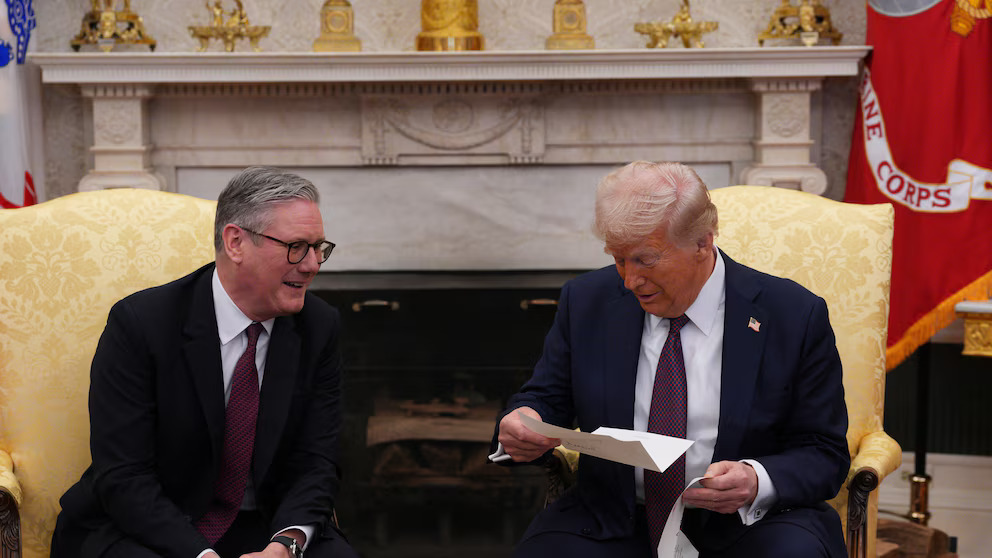Trump warns Russia with trade punishment, vows rapid arms support to Ukraine

The Monday announcement marked the first time Trump has formally committed to new military aid for Ukraine since returning to the White House.
US President Donald Trump has unveiled a plan to supply advanced weapons to Ukraine through Nato countries, while warning that Russia’s trade partners could face crippling tariffs if a peace agreement is not reached within 50 days.
Speaking after a meeting with Nato Secretary General Mark Rutte in Washington, Trump said the United States would provide “top-of-the-line weapons” worth billions of dollars to Ukraine, with the military aid set to be delivered rapidly to the battlefield through Nato channels.
The initiative aims to boost Ukraine’s ability to defend itself against ongoing Russian attacks.
“We want to make sure Ukraine can do what it wants to do,” Trump said during the briefing.
Rutte confirmed that the US would begin massive supply efforts through Nato and said European nations would contribute by handing over their own Patriot air defence systems to Ukraine.
These systems, critical in countering Russian missile strikes, would then be replaced by American-made units.
While neither leader specified the exact nature of the military support, Rutte noted the agreement includes “missiles and ammunition”.
Trump added that the weapons would be delivered without delay, reinforcing Ukraine’s efforts on the frontline.
“If I was Vladimir Putin today... I would reconsider whether I should not take negotiations about Ukraine more seriously,” said Rutte, with Trump nodding in agreement.
Ukrainian President Volodymyr Zelensky later confirmed that he spoke with Trump following the meeting.
In a post on X, he thanked the US president for his “willingness to support Ukraine and to continue working together to stop the killings and establish a lasting and just peace.”
“We discussed the necessary means and solutions with the President to provide better protection for people from Russian attacks and to strengthen our positions. We are ready to work as productively as possible to achieve peace,” Zelensky said.
Alongside the weapons pledge, Trump issued a warning to Russia and its trading partners, announcing that the US would impose 100% secondary tariffs if a peace deal is not secured within 50 days.
This measure would target countries that continue to do business with Russia, making their goods far more expensive in the US market.
Trump explained that, for instance, if India continues purchasing oil from Russia, Indian goods arriving in the US would face a 100% import tax, driving up prices and making them less competitive.
He said the move is aimed at pressuring Russia economically by restricting its revenue streams.
With oil and gas accounting for over 60% of Russia’s exports and about a third of its state revenue, such tariffs could significantly weaken Moscow’s war financing ability.
Despite the tough talk, the Moscow Stock Exchange Index rose sharply following the announcement.
Analysts suggested the markets had been bracing for even harsher sanctions after Trump last week hinted at a major statement regarding Russia.
The Monday announcement marked the first time Trump has formally committed to new military aid for Ukraine since returning to the White House.
His remarks also reflected a shift in tone, with a more critical stance on Russian President Vladimir Putin.
Trump expressed frustration at the ongoing conflict and the failure of past attempts to find a resolution. He noted that repeated conversations with Putin were followed by intensified Russian airstrikes.
“After that happens three or four times you say: the talk doesn't mean anything,” Trump said. “I don't want to call him an assassin but he's a tough guy. It's been proven over the years, he fooled a lot of people – Clinton, Bush, Obama, Biden. He didn't fool me. At a certain point talk doesn't talk, it's got to be action.”
Although Trump previously suggested that the war could be quickly resolved, his latest remarks suggested a more impatient tone and an emphasis on action rather than dialogue.
Two earlier rounds of ceasefire talks between Russia and Ukraine this year yielded no agreement, and no further meetings have been announced. Moscow has blamed Ukraine for the stalled negotiations.
Meanwhile, US envoy Keith Kellogg visited Zelensky in Kyiv on Monday. The Ukrainian leader said the meeting was productive and once again voiced appreciation for the support from the United States.
In Moscow, the official response was muted, though early reactions signalled scepticism. Former Putin aide Sergei Markov described the tariff threat as “a bluff”, claiming it showed Trump had “given up on trying to achieve peace in Ukraine”.
Russian Senator Konstantin Kosachev also dismissed the announcement, saying, “If this is all Trump had to say about Ukraine today, then so far it's been much ado about nothing.” He added that much could change in 50 days — both on the battlefield and in the political landscape of the US and Nato.
